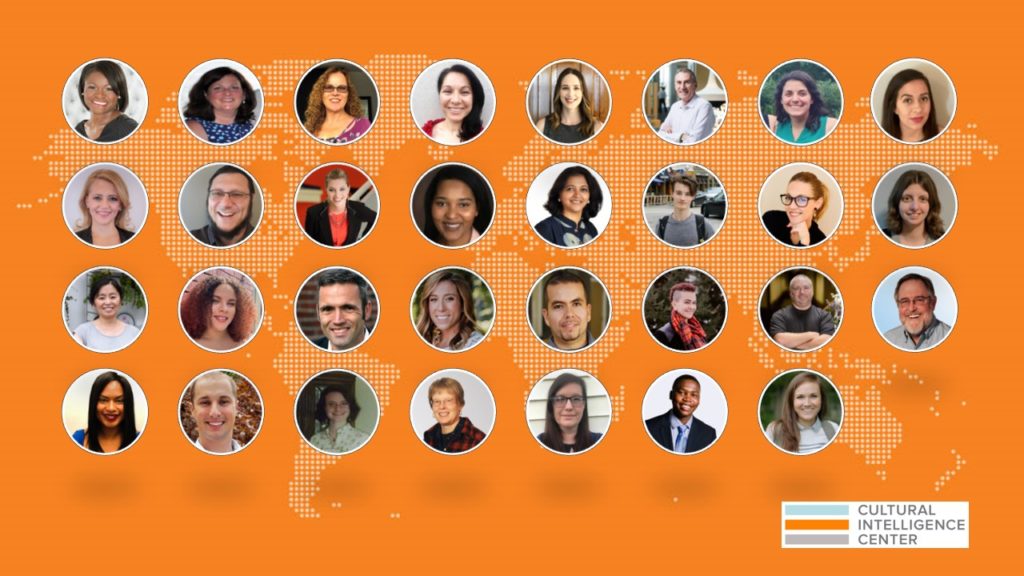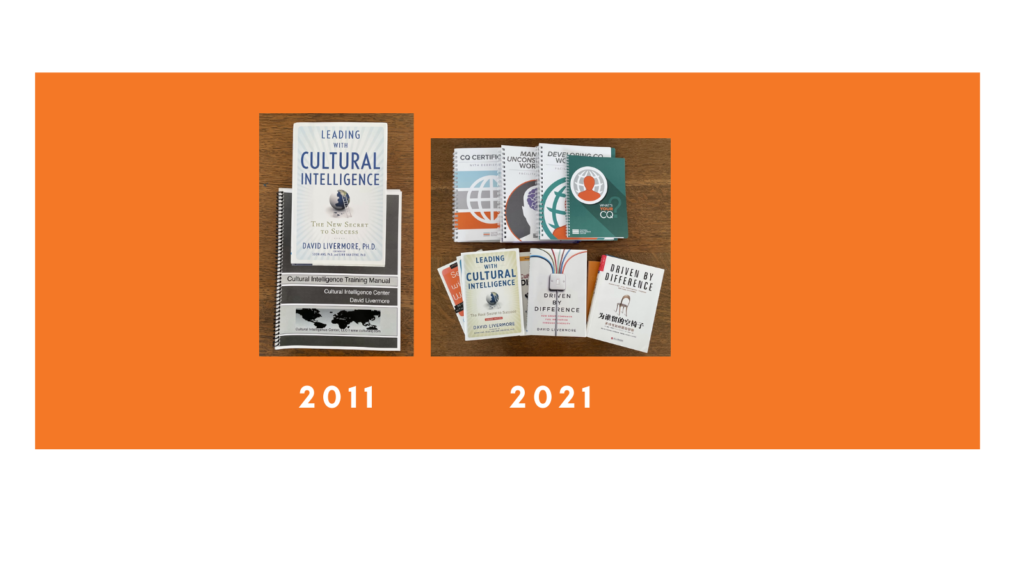
Ten years ago, I left my day job at a university to devote my full attention to leading the Cultural Intelligence Center. We officially incorporated the Center in 2004, but it wasn’t until 2011 that we set ourselves up as a fully viable organization. This was the same year that Osama bin Laden was killed, the Arab Spring emerged, and riots were occurring across the UK, Myanmar, and the US. The time was ripe to take cultural intelligence beyond the ivory tower and into the real world.
I was scared and excited. Would there be enough work to support my family? Were enough people committed to improving how they work with people from different backgrounds to support an organization solely focused on cultural intelligence? Apparently yes! Ten years later, I’ve logged millions of miles, taught thousands of leaders, and been joined by dozens of staff and associates who are taking this work further than I ever dreamed.
As we cross this ten-year milestone, I wanted to share a few of my personal reflections, not in any particular order.

1. FOLLOW YOUR CURIOSITY, NOT YOUR BUSINESS PLAN
People often ask me for advice on how to take an idea like cultural intelligence and monetize it. There are experts who teach that kind of thing, but I never set out to be a business owner, author, or speaker. I’ve been fascinated by people and cultures for as long as I can remember. That’s what drove me to pursue the jobs I had, the research I did, and eventually, the books and speaking that emerged. I’ve been surprised by how much I’ve enjoyed the entrepreneurial aspect of leading the CQ Center, but the work we do is what got me started and what keeps me going.
2. CQ IS NOT A SILVER BULLET
Soon Ang, Linn Van Dyne, and I are incredibly humbled by the way CQ has been adopted by so many individuals and organizations around the world. But we sometimes encounter individuals who are more dogmatic about the benefits of CQ than we are. The research supporting CQ’s predictive validity is astounding. But it’s not a be-all, end-all to the complex issues of colliding people and cultures. CQ provides a critical link for offering individuals and organizations the foundational skills for working effectively with diverse groups. We do a disservice when we present CQ as the silver bullet.
3. STOP SHOUTING AT PEOPLE
I’ve learned a lot about addressing issues of racism, privilege, and intercultural understanding over the last decade. Sometimes I’ve kept the conversation too clinical and safe, and other times, I’ve let it get too heated. Some will disagree with me, but I haven’t seen any lasting benefit from shouting at people about their ethnocentrism or privilege. I’m not afraid to make people uncomfortable—that’s where real growth happens. But I haven’t seen any lasting impact from shaming diatribes. We have to find the zone of productive disequilibrium.
4. TAKE WHAT YOU NEED FROM CRITICISM AND MOVE ON
I’ve learned far more from my critics than from my fans. But there have also been too many times when I allowed one dissenting voice in a seminar to overtake the whole day. One of the first CQ seminars I taught had so much negative energy in the room, and I just couldn’t figure it out. I knew there were some things I could improve, but I felt pretty confident I did what the client wanted. Only later did I learn that a couple of the participants had just learned they were being laid off but weren’t allowed to discuss it. We never know what other dynamics are going on for someone. Reflect on criticism, learn from it, and then keep going.
5. CQ IS A LOT HARDER TO APPLY THAN TEACH
The first few years, our staff was just me and a couple of other individuals. Our small team did everything—answer inquiries, printing, and shipping, training, billing, etc. In the last four years, our staff’s size and diversity have grown exponentially, with people from a variety of cultures, backgrounds, and skillsets joining us across multiple time zones. Just like we teach, our diversity has made us stronger but wow! It’s a whole lot easier to teach CQ to other organizations than it is to apply it to ourselves. We’ve made some mistakes along the way, and we’re committed to continuing to grow in our own pursuit to BE a culturally intelligent organization!
6. A SPIRIT OF GENEROSITY WINS
Call me an idealist, but I expected the intercultural industry to be a place that welcomed and celebrated different models, assessments, and training approaches. After all—isn’t that what we teach? Instead, what I’ve found is a highly competitive and, at times, antagonistic dynamic between many intercultural consultants and organizations. I hear way too many stories about intercultural training organizations pitting themselves against others doing the same work. There’s so much work that needs to be done, so why not cheer on any effort to improve the way we bridge our divides? Julia Middleton from Common Purpose, Ted Dale from Aperian Global, and the late Geert Hofstede were people I was told were competitors, but in reality, I found them to be friends and colleagues I’ve come to know and trust. I could list many others as well. Comparing notes with others in the field has been nothing but fruitful.
7. AWARENESS AND CONVERSATION AREN’T ENOUGH
So much of what happens in the name of diversity and cultural competence training is an emphasis on self-understanding and dialogue. If we don’t first understand our own cultures, there’s little hope we can work and relate effectively with someone from a different culture. But simply knowing that I’m more individualist than you doesn’t give me the skills I need to work effectively with you. We have to keep getting better at teaching skills and developing solutions that bring a lasting behavior change.
8. ACADEMICS NEED PRACTITIONERS. PRACTITIONERS NEED ACADEMICS
I’ve lived most of my professional life with one foot in the academic world and the other in the applied world. Those divergent worlds characterize our work at the CQ Center as well. Linn Van Dyne and I are ruthlessly committed to research that is robust and relevant. As a world-leading psychometrician, Linn holds me accountable to ensure we’re remaining true to the research. But she’s equally open to hearing my input on ways to present the research to ensure it’s meaningful and relevant to practitioners.
9. IT TAKES CQ TO MAKE A CASE FOR CQ
I talk with many CQ practitioners who are frustrated by how hard it is to get organizations and leaders to invest in cultural intelligence programs. The best tool for “selling” CQ is our own CQ! The perspective-taking and adaptation of language that we exhort people to use when working with a colleague from a different background need to be used when we talk with an HR director or dean about how CQ is relevant to their organizations. We need to beware of demonizing an individual who wants to know the bottom-line impact of CQ. Organizations have real-time and budgetary constraints, and it’s on us to make a case for them in a way that resonates.
10. JOURNALING AND RUNNING ARE MY SECRET SAUCE
I recently went back and read my journals from the last decade. I think I learned as much from re-reading them as I did from when I wrote them. If you’ve read anything I’ve written or listened to me speak, I can guarantee those thoughts were worked out first with my pen and my running shoes. I journal and run almost every day, wherever I am in the world. These habits allow me to be free from my phone, ruminate on ideas, and take in my surroundings.
I’m enormously grateful for the work we’ve been able to do over the last decade, but we’ve barely scratched the surface. Everything suggests our world will be even more interconnected over the next ten years than it is today. That’s sure to bring growing collisions of different ideologies, people, and cultures. But it also offers incredible potential. CQ is bigger than any one of us. But together, cultural intelligence provides a way to improve the ways we live together, solve problems together, and recognize one another’s dignity. Here’s to another ten years of striving to build a more culturally intelligent world together.
Interested in attending one of our virtual training programs? Click on the links below!

Comments are closed